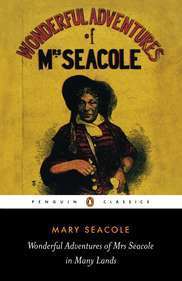What do you think?
Rate this book


224 pages, Paperback
First published July 1, 1857
Mary Seacole, the daughter of an Creole mother and a Scottish general, was born in Kingston, Jamaica in 1805. From a young age she wanted to explore the world, especially the land of her father, and find a place where she could use her talents as a nurse. But not only that; Mary was also a great business woman. While she travelled all across Jamaica and Panama, she opened up hotels where she sold good food alongside medical care.
Still, her work during the Crimean War (1853-1856) got her the most fame. When she read in the papers that the English soldiers were dying en masse because of cholera and diarrhea, she packed up her stuff and took a boat to the Crimea. There, Mary set up a hotel like the ones in Jamaica and Panama and became known because she sold English wares and because of her professional medical treatments.
[Thomas Day]
How does a bastard, orphan, daughter of a nurse and a
Scotsman, born in a English
colony in the Caribbean by providence
in foulness, and divergent
Grow up to be a doctress and a merchant?
[Alexis Soyer]
The mighty mother from a Creole mother
Got famous by working harder than any other
By being more successful than her brother
By nurturing among the pother
By eighteen, she brought her Jamaican wares to London
For the English to discover
[Florence Nightingale]
And every day while slaves were being slaughtered and carted
Away across the waves, she struggled and kept her hopes up
Inside, she was longing for a place to belong and thrive
The sister was ready to travel far to keep her sons alive
[Edwin Seacole]
Then Cholera came, and devastation spread
A woman saw her people and family die in their bed
But she dried her tears and fought the foul beast
She tended to the sick by a combo of West and East
[William Russell]
Well, the word got around, they said, “This woman is a saint, man”
Black and white patients got cured under her treatment plan
Her brave adventures in the Crimea gave her true fame, but
sadly the world forgot her name, so what’s your name,
Madam?
[Mary Seacole]
I am Mary Seacole
My name is Mary Seacole
And there’re a million men I've not tended to
But just you wait, just you wait…
Recent news from America bring the intelligence that the Government of the United States has at length succeeded in finding a reasonable excuse for exercising a protectorate over, or in other words annexing, the Isthmus of Panama. To any one at all acquainted with American policy in Central America, this intelligence can give no surprise; our only wonder being that some excuse was not made years ago.Mrs. Mary Seacole makes A Lady's Life in the Rocky Mountains look like an imperialist walk in the park that didn't too much and came nigh twenty years too late. West Indies? Yep. Central America? Yep. England, Turkey, the infamous historicality of Crimea? Yep, yep, yep. Seacole wasn't some pampered twit in a white coat who rode the parent's financial coat-tales to an MD and thereupon sat back and conducted human experimentation and made bank. You couldn't even find her comparison in the militaries today, what with them all partaking domination rather than warfare between two countries that didn't as much resemble cancerous infection, although the fact that the Crimea War boils down to two different strains of Christianity battering away at each other is rather ludicrous the modern day. Doctors Without Borders fits in terms of standard definition, but considering the shit that the UN and Peace Corp and every other interventionist claptrap pull, I find it hard to believe that the members would do good without a 401k behind them. What Seacole's life encompasses is glory, a word more oft misconstrued in order to excuse rape and genocide than put to the test of humanity and found more than qualified. Various pages on the Internet speak of overestimation of her abilities, thus implying an overestimation of her in history. I say, having read the amount of demographic specific literature I have in both the hegemonic and the otherwise sense of the word, this is a rare piece of narratological work, subverting race, blackness, gender, nationalism, duty, family structure, love, economics, travel narrative, and so much more in the age old year of 1857.
If I had been in the least humour for what was ludicrous, the looks and curiosity of the Russians who saw me during the armistice would have afforded me considerable amusement. I wonder what rank they assigned me.It's not as if Seacole doesn't have a decent prose style, either, so the low rating is even more baffling. Maybe it's the work's insistent refusal to be regulated to some nondescript corner while the Victorian period has its handy dandy whitey say. The world was grand even then, and you didn't have to conquer to discover it for yourself.
Some people, indeed, have called me quite a female Ulysses. I believe that they intended it as a compliment; but from my experience of the Greeks, I do not consider it a very flattering one.
Unless I am allowed to tell the story of my life in my own way, I cannot tell it at all.